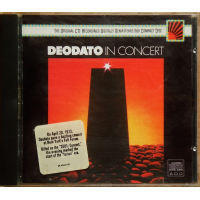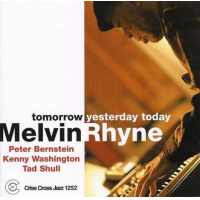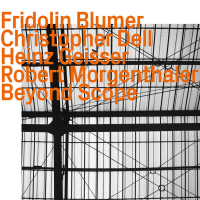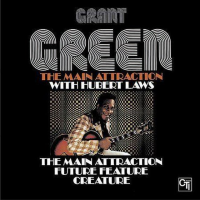Home » Jazz Articles » Liner Notes » David Binney: Barefooted Town
David Binney: Barefooted Town
Continuing Saga of the Strong Seeker
I remember distinctly during the 2007 Montreal Jazz Festival, sifting through and measuring up the usual blur of stimuli, seeking out the prizes among prizes in the program. In one corner, there was Wayne Shorter, in the finest of his performance I'd ever heard—playing up his suits as composer and soloist by meshing his free-wheeling quartet and the score-heeding Imani Winds. And then, in another corner, as part of the late night haunt of the Salle du Gesu series where much of the festival's meatier music takes place, another clear highlight of the festival rang out, true and bold: David Binney came out with his solid quartet, wailing and brooding, locked into the provocative evocations of his unique writing and seizing multiple "aha" moments as a player.Shorter and Binney stole the show that year, in my mind, and the artistic links between them are greater than first impressions might suggest. Both saxists have honed their artistic personae through a passionate and singular way with both horn and pen (or mouse), and both have trail blazed subtle pathways of expression and embraced melodic/harmonic roads less taken. They are neither avant-garde or mainstream, and generally dodging anything akin to dogma or ism. They are who they are, and getting deeper so.
This delicate yet binding balance is something we hear plenty of on Binney's third Criss Cross album, Barefooted Town, a work bristling with intelligence and energy on many levels. Plus heart: Binney blows mightily, as one who must be called of the great alto saxists of our time, and his writing can be tough and artfully knotty, but he is also an inveterate romantic, on his own terms. From the compact suite that is the opening tune, "Dignity," with its yearning vocal part by the leader at the end, through the muscular impressionism of title track and the angularly balladic finale, "Once, When She Was Here," this song set tells heartfelt stories we can sense, through the prism of abstraction.
Joining the leader in this sextet context are allies old and new, all sensitive to what Binney is about. We know to expect empathic interplay from Binney's longtime collaborator Mark Turner, an uncommonly sensitive tenor saxophonist, but the striking newcomer to the fold is young, fast-rising trumpeter Ambrose Akinmusire, a thinkinger person's dynamo who blows hot and cold on this session— in the most artful way. Binney's solid yet, equally critically, sentient and flexible rhythm mates, pianist David Virelles, bassist Eivind Opsvik, and drummer Dan Weiss, establish an ideal, flexible foundation for Binney's creations.
No less a source than Pat Metheny has registered his great admiration for Binney's recent work, enthusing wildly about Binney's powerful previous album, Graylen Epicenter, on his own Mythology label. And, not incidentally, some Metheny-esque characteristics play into Binney's compositional palette, more in sweep and spirit than literal musical vocabulary. The addition of Binney's own spare vocal parts in the mix, a third lead voice mixed with alto and trumpet, makes for another parallel to Metheny's own use of wordless voice as a humanizing textural element.
At the same time, Binney's compositional interests over the years have also synched up with the musical playing field of musicians including Steve Coleman and other post-M-Base musicians. (Akinmusire's time spent playing with and learning from Coleman makes the emerging high-profile trumpeter an ideal part of this ensemble). It's all about the intellectual pursuits of metric maze-making, of finding funk and a new cerebral flavor of swing through experimentation with meters, lines and rhythms off to the side of standard metric practice. We hear less of that branch of Binney's writing on Barefooted Town, but those ideas are woven seamlessly into the music's fabric.
No doubt partly because of his uncompromising musical voice and resistance to fitting tidily into given and/or commercial byways of the jazz scene at large, Binney is one of those important American jazz artists who has often found more love across the Atlantic and other shores. To say that America fails to recognize the majesty and sophistication of its greatest art form, jazz, is a bumper-sticker cliché and a waste of ink by this point, but Binney's extended saga as an American deserving greater recognition in his own country revives the old saw.
But he is American, through and through. Born in Florida, decamping briefly in Detroit and mostly raised in the humble beach burg of Ventura, California (also the home turf of Joanne Brackeen, incidentally), Binney made the logical eastward trek to New York in 1980, a talented 19-year-old who quickly raised his own bar after studies with Phil Woods, Dave Liebman and George Coleman. But from the beginning, Binney sounded like a musician with a strong sense of self. He has always tended toward self-reliance and self-definition. Binney launched his recording life with Point Game, on Owl, with the seminal help of an NEA grant, and recorded for Criss Cross, ACT, Red and other labels, but he also followed his DIY heart and launched his own label, Mythology, in 1998 and has produced a goodly number of albums by now, his own and others.
Now, as Binney—born in 1961—crosses the mid-stride, mid-career border into life as a fiftysomething, we can look back over his sizable body of work to date and see the evolutionary trails along the way. We can follow the artistic line from Barefooted Town all the way back twenty-plus years, and recognize a strongly creative and personal approach to music which has been at once assured and ever-searching and growing. He worked in distinctive semi-electric bands early on, Lost Tribe and Lan Xang, with such empathetic cohorts as tenor saxophonist Donny McCaslin, drummer Ben Perowsky and guitarist Adam Rogers, fashioning a bright and refreshing late-breaking ripple in the "fusion" sound, with artfulness fully engaged.
Along the way, he has worked regularly with such kindred spirits—and well-known jazz world mainstays—as Chris Potter, Craig Taborn and Brian Blade—often in his regular laboratory and hometown gig haunt, the 55 Bar in Greenwich Village. The 55 is a famed room, of course, an intimate but mighty venue just around the corner from the Village Vanguard, and known to host music of a heated and venturesome nature. Binney is among its prized regulars on the roster. In a sideman role, Binney has been tapped by Cecil McBee, the Gil Evans band, Jim Hall, Uri Caine's jazzed-up/jazzed-down classical project, Medeski Martin & Wood. To cite a couple more relevant names, he has also played with both Tony Williams on "Nefertiti"), with the task of holding down the rhythmic fort left to Virelles and bassist Opsvic's hypnotically tolling chords, running from top to bottom. Binney's solo leans into the winds of abstraction and dissonance, going expressionistic for a cause, while the long-toned melody descends into the mix, with Akinmusire's low tones juxtaposed against Binney's ethereal vocal part on high.
Towards the album's final stretch, the going gets more relaxed and reflective, easing out of the more fiery episodes earlier in the journey in sequence of this carefully-paced album. "A Night Every Day" lays out its simple, cyclical melody—almost a chant—loosely among the horns, in a way reminiscent of the old Dave Holland quintet context (with its front line, it happens, featuring a young Steve Coleman).
Closing on a wistful grace note, Barefooted Town drifts away purposefully with "Once When She was Here" (the title itself sets up an expectation of yearning and introspection)
This darkly lovely ballad is introduced by Virelles' tender rubato cadence of chords hanging in air and with its pining but cool melody stated in a kind of entranced breathiness. The song ends, like many of Binney's pieces, with a looping coda theme, feeling like a place of arrival in the song's structure, half-unexpected but ultimately feeling just right.
Come to think of it, the tune's harmonic palette and uncommon melodic twists lead us to come to think of another poetic balladeer, Wayne Shorter. Both rank highly in the implicit, cross-idiomatic confederation of self-knowing searchers.
Liner Notes copyright © 2026 Josef Woodard.
Barefooted Town can be purchased here.
Contact Josef Woodard at All About Jazz.
Josef Woodard is a freelance critic / journalist on the arts, with a focus on jazz. He is also a musician.
Track Listing
Dignity; Seven Sixty; The Edge of Seasons; Barefooted Town; Secret Miracle; A Night Every Day; Once When She Was Here.
Personnel
David Binney
saxophoneAmbrose Akinmusire
trumpetMark Turner
saxophone, tenorDavid Virelles
pianoEivind Opsvik
bassDan Weiss
drumsAlbum information
Title: Barefooted Town | Year Released: 2011 | Record Label: Criss Cross
Tags
PREVIOUS / NEXT
Support All About Jazz
 All About Jazz has been a pillar of jazz since 1995, championing it as an art form and, more importantly, supporting the musicians who make it. Our enduring commitment has made "AAJ" one of the most culturally important websites of its kind, read by hundreds of thousands of fans, musicians and industry figures every month.
All About Jazz has been a pillar of jazz since 1995, championing it as an art form and, more importantly, supporting the musicians who make it. Our enduring commitment has made "AAJ" one of the most culturally important websites of its kind, read by hundreds of thousands of fans, musicians and industry figures every month.


























